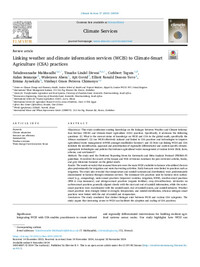Linking weather and climate information services (WCIS) to Climate-Smart Agriculture (CSA) practices

Authors:
This study synthesises existing knowledge on the linkages between Weather and Climate Information
Services (WCIS) and Climate-Smart Agriculture (CSA) practices. Specifically, it addresses the following
questions: (1) What is the current status of knowledge on WCIS and CSA in the global south, specifically the
African continent?, (2) Are WCIS effectively tailored and linked to CSA practices and technologies to improve
agricultural water management (AWM) amongst smallholder farmers?, and (3) How can linking WCIS and CSA
facilitate the identification, appraisal and prioritization of regionally differentiated and context-specific climateappropriate
technologies and policies that enhance agricultural water management at various levels (field, farm,
scheme, and catchment)?
Methods: The study used the Preferred Reporting Items for Systematic and Meta-Analysis Protocol (PRISMA-P)
guidelines. It involved the search of the Scopus and Web of Science databases for peer-reviewed articles, books,
and grey literature focussed on the global south.
Results: The results revealed that seasonal forecasts were the main WCIS available to farmers who utilised them to
plan predominantly for irrigation and water harvesting activities. Daily forecasts were linked to practices such as
irrigation. The study also revealed that temperature and rainfall (amount and distribution) were predominantly
disseminated to farmers through extension services. The dominant CSA practices used by farmers were carbonsmart
(e.g., composting), water-smart practices (improved varieties, irrigation, RWH), weather-smart practices
(IPM & crop insurance), and nitrogen-smart practices (organic fertiliser, crop diversification). Advisories on
carbon-smart practices generally aligned closely with the start and end of rainfall information, while the watersmart
practices were corroborated with the rainfall onset, end of rainfall season, and rainfall intensity. Weather
smart practices were strongly linked to drought, temperature, and rainfall distribution, whereas nitrogen smart
practices were linked with the end of rainfall and temperature.
Conclusions: The study concluded that distinct linkages exist between WCIS and various CSA categories. The
study argues that increasing access to WCIS can facilitate the adoption and scaling of CSA practices.
